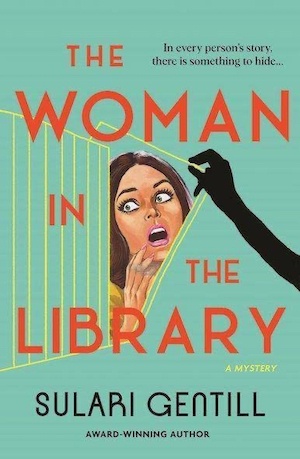
When you read Sulari Gentill’s new psychological thriller, The Woman in the Library, you may need to stop every so often and think, ‘Where am I?’ Its clever plot is like a set of nesting boxes, and you have to check which box you’re in. You may be familiar with Gentill’s ten historical novels featuring gentleman detective Rowland Sinclair and though this is not part of that series it displays the same storytelling chops.
In this story, Australian author Hannah is writing a contemporary novel set in the United States. Her main character, Winifred ‘Freddie’ Kinkaid is also an author, working on a new book in the inspiring setting of the Boston Public Library. One day she finds herself at a table with three more young people and idly muses about them. They’d make great characters in her novel, she thinks. So, what you are reading are the chapters in Hannah’s novel, concerning Freddie and her new friends.
They’ve all four quietly checked each other out, but the ice is broken when a piercing scream shatters the library’s stillness. Oddly, the scream pulls them together. They speculate, start to chat, introduce themselves and soon wander off for coffee as a group. The other woman, Marigold, heavily tattooed, has a rather obvious crush on their tablemate, Whit Metters, and the fourth is a handsome fellow named Cain McLeod. I rather wish one of the men had a more ordinary name, because Cain and Whit, while not alike in terms of spelling, are both unusual, short, trendy names. At first I had trouble keeping them straight.
After that unusual bonding experience, the four spend much time together, especially when their curiosity is raised by the discovery of a murdered woman, presumably the screamer, under a table in the library meeting room.
Hannah is a best-selling author back in Australia, and as she’s writing about daily life in another country, she accepts the offer from a Boston-based fan to review her chapters and look for anachronisms in vocabulary – ‘jumper’ instead of ‘sweater,’ ‘crisps’ instead of ‘potato chips,’ and the like – as well as any errors describing the locations. This man, Leo Johnson, is also an author, very down in the dumps about the publishing industry’s lack of interest in his book. Chapters of Hannah’s book are followed by a ‘Dear Hannah’ reaction from Leo.
At first, Leo’s advice is confined to factual matters and minor adjustments in descriptions. The fact that Freddie herself encounters these cultural quirks makes sense, as she’s Australian, too. She’s able to work on her book and live in Boston’s upscale Back Bay, thanks to a fellowship. The house where she lives contains several flats, one of them occupied by another fellowship recipient, a character whom Hannah names Leo Johnson. (A third Leo is buried in the name McLeod. Significance? Coincidence, I think.)
Her correspondent is delighted at being recognised in this way, and perhaps that contributes to his growing intrusiveness. He makes corrections, fights for his suggestions, and sends photos he thinks Hannah should use for inspiration. If his long-distance efforts to encroach on her creative territory make you uneasy, they did me too!
Meanwhile, in Hannah’s novel, the four friends are increasingly unsettled by revelations about Cain McLeod’s past. He murdered his stepfather when he was 16 and served seven years in prison. He’s now been out about that same length of time, but he tells his new friends, especially Freddie, only the minimum. When more information and past connections inevitably drip out, suspicions escalate.
Gentill plays the gradual erosion of trust nicely, with a number of startling revelations. And, the killing isn’t finished. The police are highly suspicious of McLeod and dubious of his version of his stepfather’s death. But, as their friend Whit says, he’s paid his debt.
The relationships among the friends are well developed, and, as Freddie gradually falls in love with McLeod, you hope she’s not getting in over her head. Not only is there the risk that he’s not whom he pretends to be, as Marigold warns her, there’s also the inconvenient fact that the police are watching his every move. Her proximity may put her on their radar along with him.
This is a very readable book, with a strong sense of menace generated by Leo’s correspondence. Having Freddy be an outsider adds a little extra discomfort. Not until she and McLeod visit an Aussie bar does she recognise how hard she’s been trying to fit in.
More Aussie crime writers worth noting are described here.
Ultimo Press
Print/Kindle/iBook
£6.99
CFL Rating: 4 Stars








